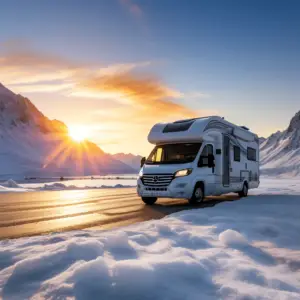It does, but too slowly to make any significant impact when it is in use. In a controlled environment, it will not evaporate and can last in its original condition indefinitely.
Antifreeze is any agent or additive that lowers the freezing point of water or water-based solutions. Simply put, antifreeze lowers the freezing point of water or water-based solutions.
Zero degrees Celsius or 32 degrees Fahrenheit freezes water. Water in plumbing systems freezes in winter due to low temperatures. Ice has a higher volume than water, thus without intervention, pipes will explode.
Without regular heat and salt-based ice melting, the impact will be severe. Pipes and plumbing systems are winterized with antifreeze to prevent freezing.
This is especially important when you intend to put away your appliances for the winter such as an RV, a backyard pool, or a cabin you own in the mountains.
Antifreeze can lower the freezing point of water to -35 degrees Celsius protecting your plumbing from exploding and bursting.
Table of Contents
So Does RV Antifreeze Evaporate?
While it is possible for the antifreeze solution to evaporate, this will happen to a negligible degree which means you do not have to worry about the solution dissipating.
Antifreeze can last forever under perfect laboratory settings because it resists evaporation.
For five to six months, you won’t need to replenish the solution, and when you do, it will have changed little.
When the solution contacts atmospheric bacteria, it degrades biologically. This contaminates the solution and may reduce its anti-corrosion properties. The contaminated fluid corrodes plumbing systems, thus it must be cleaned out and replaced immediately.
Degraded or fouled RV antifreeze changes color from a bright pink to red which can stain your porcelain toilets and bathtubs forcing you to bleach the surfaces to restore them.
RV antifreeze also comes with additives to prevent cavitation of your plumbing systems so that naturally occurring substances that may be in your water such as calcium and certain sulfate compounds do not form lime cavities in your pipes.
Is All Antifreeze The Same?
Not at all.
Auto antifreeze is different than RV. Engines use automotive antifreeze. As a coolant, it cannot replace RV antifreeze. RVs cannot be winterized using car antifreeze. Different things.
RV antifreeze is non-toxic, whereas car antifreeze is dangerous even in little amounts.
RV antifreeze is used to winterize plumbing systems and may get into your glass of water as you drain it to de-winterize your lodge.
As you reuse your plumbing system, trace amounts of this winterizing chemical will remain in your water, but they are harmless. This does not indicate it is edible. RV antifreeze is pink and smells delicious but nasty. It sometimes intrigues precocious children, and if swallowed like a soft drink, it can wreck your body. Stay away from kids and pets.
Which Type of RV Antifreeze is the Best for Plumbing?
There are two main types of RV antifreeze:
- Ethylene glycol-based antifreeze ( EGW )
- Propylene glycol-based antifreeze ( PGW )
Both of these are suitable for domestic plumbing and will winterize your home and appliances satisfactorily but they have a few key differences.
EGW antifreeze was developed for cars over a century ago. More adaptable, it may be used in summer and winter. Widely available and cheap.
Do not use toxic EGW for plumbing. It’s used since killing requires a lot. These quantities are challenging to reach at home and work. Minor intoxication occurs in little dosages.
When this toxicity is a cause for concern PGW is the preferred antifreeze. It is less volatile and is food safe which makes it the better option for plumbing where accidental ingestion is a definite possibility.
Can RV Antifreeze Melt Ice?
Antifreeze is designed to prevent water from freezing but it will have no effect on ice that has already formed.
This is why it is best to winterize slightly before winter temperatures fall to zero or below since there may be ice already forming in your plumbing.
If ice has already formed in your plumbing you have to apply de-icing salts to melt the ice before applying any winterizing agents such as antifreeze.
Takeaways…
- RV antifreeze plays a critical role in protecting plumbing systems from inevitable damage in the winter.
- Propylene glycol-based RV antifreeze is safer for use compared to ethylene glycol-based antifreeze.
- Refill antifreeze if the color changes from pink to any other. A color change may mean the antifreeze is degraded or fouled enough to stain your plumbing.
- Remember to always keep antifreeze away from the reach of children and pets since even the non-toxic antifreeze, when consumed in large quantities will pose a severe problem to health.
- RV antifreeze is not the same as automotive antifreeze.
- Automotive antifreeze is highly toxic even in small quantities


